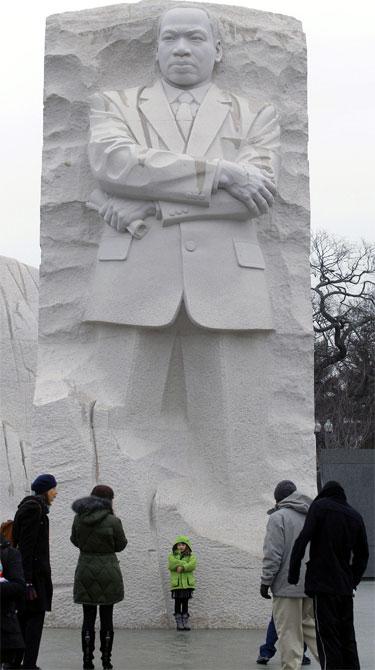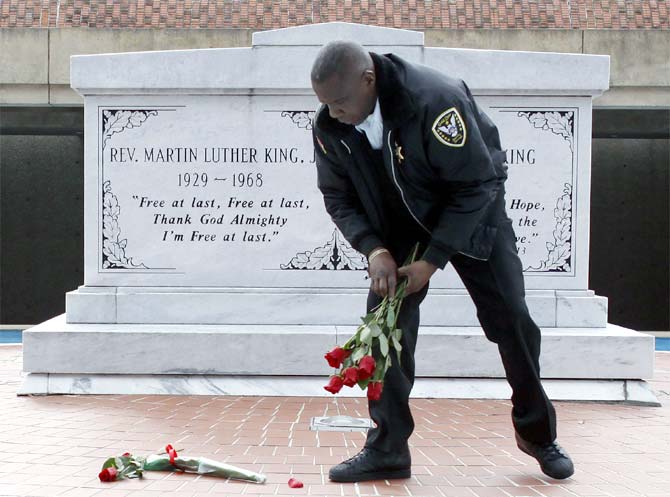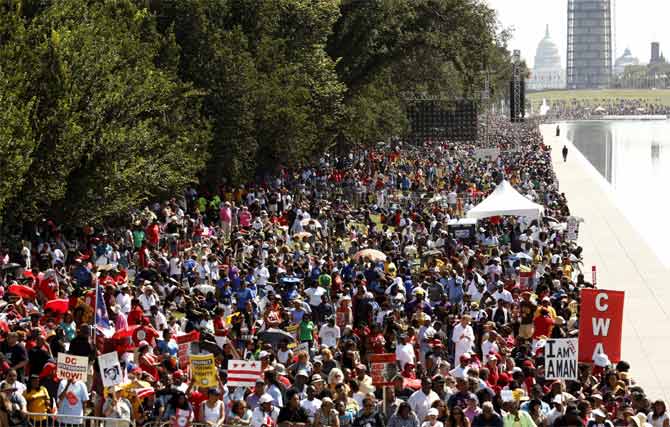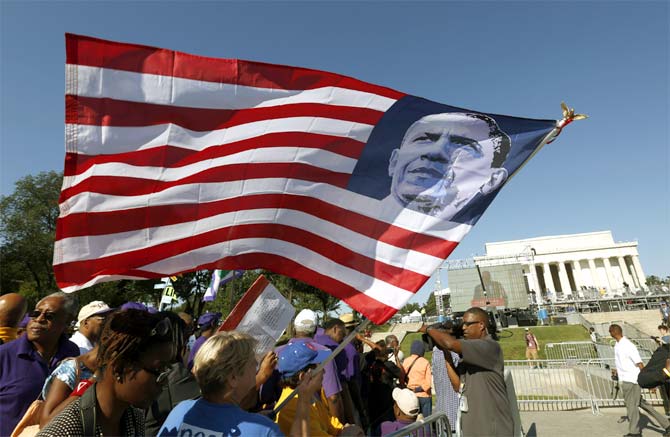Photographs: Gary Cameron/Reuters
Dr Martin Luther King Jr's 'I Have a Dream' speech is one of the greatest speeches of the 20th Century.
August 28 marks the 50th anniversary of that brilliant piece of oratory which paved the way for equal rights for African Americans in the United States -- and continues to be relevant in a world woefully short of giving equality to all.
'To other countries I may go as a tourist, but to India I come as a pilgrim.'
Profoundly influenced by Mahatma Gandhi, Dr Martin Luther King Jr pointed this out on his only visit to India in 1959, four years before he delivered the 'I have A Dream' speech' -- considered as the pinnacle of his many oratorical achievements.
On that visit, Dr King stayed at the Sabarmati Ashram, home to the Mahatma for 18 years, and met Prime Minister Jawaharlal Nehru.
At the Martin Luther King National Historic Site in Atlanta stands a bronze statute of the Mahatma, the first to be installed on federal land in the United States.
Like Gandhi, Dr King never held political or public office. He was a preacher and civil rights leader demanding the end of discrimination against African Americans and is America's leading moral icon.
Revered and respected by Blacks and many Whites, his birthday is commemorated as Martin Luther King Day and is a national holiday. His memorials in Atlanta and Washington are historic sites.
On August 28, Barack Obama, America's first African-American President, will deliver a speech from the steps of the Lincoln Memorial, the same site where Dr King gave the 'I Have a Dream' speech.
Obama -- no mean orator himself -- and his speech writers have a tough task to match those magic words delivered 50 years ago!
Please ...
Dr King was the youngest at that time to receive the Nobel Prize
Image: King Centre security officer Kevin Baxter collects roses left at the crypt of Dr Martin Luther King, Jr in Atlanta.Photographs: Tami Chappell /Reuters
The dream that Dr King spoke of in that famous speech in Washington that summer day -- among the first to be telecast via satellite on television -- resulted in the passing of the landmark Civil Rights and Voting Rights acts by the American Congress.
At a time when Blacks were forced to face segregation in schools, public transport, jobs etc, the acts banned discrimination in public places and in employment.
It gave Blacks the right to freely exercise their vote, a far cry from when they could be lynched for just trying to register to vote.
Four decades later, in a realisation of that dream, America elected its first Black President.
When Barack Obama was sworn in for his second term, he took the oath of office on the Bible used by Dr King.
Obama also keeps a framed photograph of the 1963 March on Washington, where Dr King as the last speaker at the gathering, delivered his famous speech.
A year after the 'I Have a Dream' speech, Dr King was awarded the Nobel Prize at the age of 35, the youngest recipient at that time.
Please ...
A defining moment of King's legacy
Image: Marchers along the reflecting pool on the National Mall during the 50th anniversary of the 1963 March on Washington.Photographs: Kevin Lamarque/Reuters
Around 250,000 people marched to the Lincoln Memorial in Washington in their demand for jobs and freedom on that beautiful August day.
Dr King, it is said, finished the text of the speech only that morning. While the written text was inspiring, it was what Dr King said extempore that made the speech memorable.
'Once that spontaneous inspiration took hold, King shifted forcefully into his voice as a preacher, rather than just a public speaker, and for the first time a national American audience was exposed to King's real sermonic power,' wrote David J Garrow in an article 'King: The March The Man The Dream in American History magazine in 2003.
The speech with its towering ideals that transcended nations and peoples was the crowning moment of that rally -- and the March to Washington became defined by Dr King's Dream.
Please ...
'I have a Dream' continues to be relevant today
Image: An US flag with Barack Obama's image during the 50th anniversary of the 1963 March on Washington.Photographs: Kevin Lamarque/Reuters
Dr King was assassinated on April 4, 1968, in Memphis, Tennessee. He was just 39 years old.
His funeral was attended by over 100,000 mourners.
The previous day, while Dr King was campaigning on behalf of strking sanitation workers in Memphis, he had said this in his final speech:
'Like anybody, I would like to live a long life -- longevity has its place. But I'm not concerned about that now. I just want to do God's will. And He's allowed me to go up to the mountain. And I've looked over, and I've seen the Promised Land. I may not get there with you. But I want you to know tonight that we, as a people, will get to the Promised Land..'
The US is observing a week-long celebration of the historic speech, starting with a March to Washington last Saturday, August 24.
On Wednesday, August 28, former US Presidents Jimmy Carter and Bill Clinton, both hailing from the American South, will join President Obama to mark the anniversary.
The ceremony will be beamed live across the world, reminding us that Dr King's Dream continues to remain relevant in a world still very short of giving equality to all who live here.





article